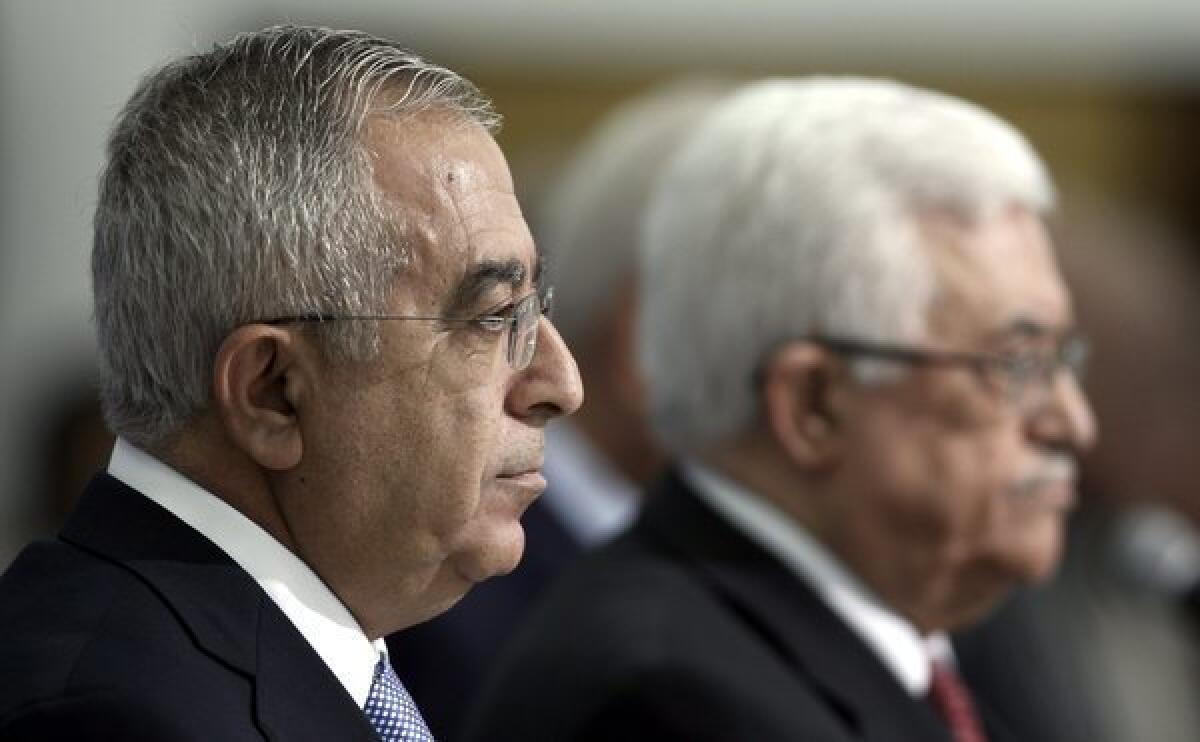Palestinian Authority prime minister resigns

- Share via
JERUSALEM -- Embattled Palestinian Authority Prime Minister Salam Fayyad resigned late Saturday after struggling for years against political rivals and lackluster public support.
Authority President Mahmoud Abbas, who in recent months had also clashed with Fayyad, accepted the resignation, but asked him to remain in office until a replacement is named, according to Palestinian Authority spokeswoman Nour Odeh.
The departure means that a new Palestinian government, the fourth since 2007, could be formed in coming weeks.
Since Abbas will remain as president, Fayyad’s resignation is unlikely to have a significant impact on the Obama administration’s renewed efforts to relaunch peace talks, but it may complicate plans promoted by Secretary of State John Kerry to unveil new economic development in the West Bank.
Fayyad, 61, had served as prime minister since 2007. The former International Monetary Fund banker was highly respected by international donors, including the U.S., and was credited with reducing government corruption and reforming Palestinian institutions.
But Fayyad’s tenure was bitterly opposed by many inside the two largest Palestinian factions. Hamas, the Islamist militant group that controls Gaza Strip, viewed Fayyad as a Western pawn, while officials in Fatah, the mainstream West Bank party led by Abbas, resented that so much power was vested in a politically independent person.
In recent months, many had come to blame Fayyad for the authority’s cash shortages. Under Fayyad, spending increased as he tried to build government institutions in anticipation of statehood. But when peace talks stalled, the PA was left with a $100-million monthly deficit.
Fatah lawmaker Najat Abu Bakr said Fayyad’s policies “made our life worse than ever before.” Under Fayyad, she said, the authority’s debt grew from $1 billion to $3.5 billion.
Tension with Abbas, who previously had protected Fayyad and rejected offers by him to resign, increased earlier this year when Fayyad allowed the authority’s finance minister to quit against Abbas’ wishes. Still, Fayyad remained popular with the international community because of his image and actions as a political moderate.
U.S. officials and other Western nations in recent days had urged Abbas to keep Fayyad in control, warning that international funds could be at risk if he is replaced.
The Obama administration recently announced it would resume financial assistance to the PA, which it suspended last year after Palestinians turned to the U.N. for statehood recognition and moved to reconcile with Hamas, which the U.S. considers a terrorist organization.
In a statement, Abbas, who is expected to leave Sunday for a trip to Jordan and Kuwait, thanked Fayyad for his service and pointed “to the exceptional achievements of the government in serving the national project and building the institutions of the independent State of Palestine in difficult times.”
It remained unclear whom Abbas would select to replace Fayyad. He might opt to assume the role himself. That’s the plan under pending reconciliation talks with Hamas to form a new unity government between the two factions, which split in 2007.
[For the record, 3:15 p.m., April 13: An earlier version of this post incorrectly said the two Palestinan factions split in 2006. They split in 2007.]
Under those talks, which are being mediated in Cairo, Fayyad was expected to resign anyway, largely because Hamas insisted that he not serve in the new government.
Another possibility is Muhammad Mustafa, head of the Palestine Investment Fund, the investment arm of the Palestinian Authority. Like Fayyad, he is a Western-educated former World Bank staffer and graduate of George Washington University.
Whoever replaces Fayyad may only be in the post temporarily if Palestinian leaders proceed with plans to hold elections for the first time since 2006. A new vote has been repeatedly postponed because of the split between Fatah and Hamas.
Earlier this month, Palestinian election officials said they had completed voter-registration work in Gaza Strip and the West Bank.
Fayyad’s service in the Palestinian Authority was always rocky. He was named finance minister for now-deceased PLO leader Yasser Arafat in 2002, but quit in frustration three years later.
In 2006, Fayyad led the newly formed Third Way party and won a seat in the Palestinian parliament. A year later, he was asked to become finance minister of a short-lived unity government formed by Hamas and Fatah.
After political differences between the factions briefly erupted into warfare in 2007, rival governments were established in Gaza and the West Bank. Abbas named Fayyad prime minister and finance minister of the new Fatah-led administration in Ramallah.
In recent months, some Palestinian protesters, angry over delays in receiving their government salaries, have called for Fayyad’s resignation.
In March, the Palestinian Center for Policy and Survey Research found that the approval rating for Fayyad’s government stood at 25%, down from 34% in December.
ALSO:
Snapshot of Venezuela after Chavez
Muslim women fire back at the ‘Topless Jihad’
Canada police reopen investigation into alleged gang rape
More to Read
Sign up for Essential California
The most important California stories and recommendations in your inbox every morning.
You may occasionally receive promotional content from the Los Angeles Times.













